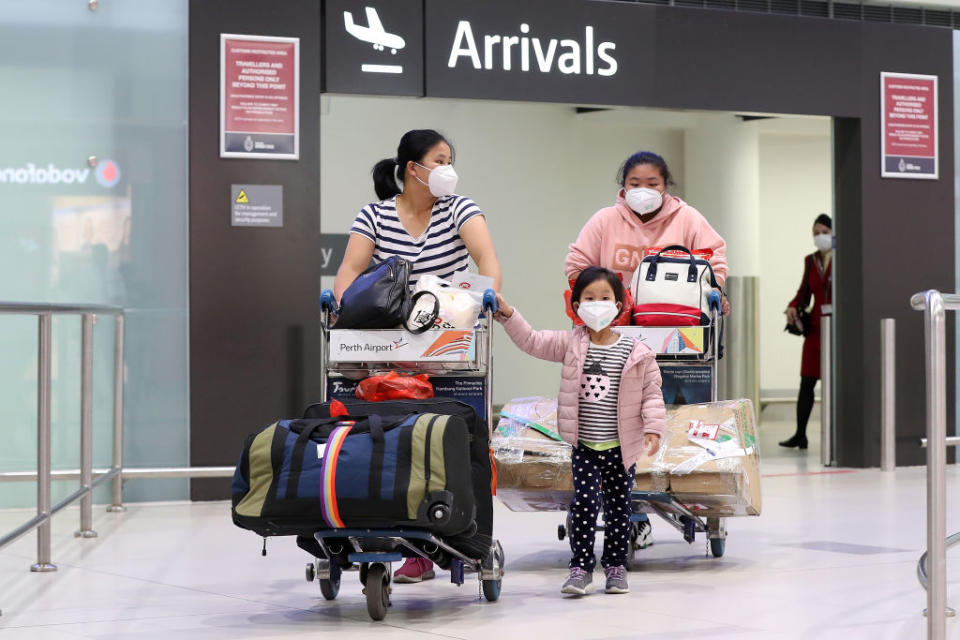'Huge challenge': How a significant coronavirus outbreak could impact Australians
Quintessential Australian past times such as a day out at the beach or a trip to the footy could soon be under threat as the deadly coronavirus continues to spread across the nation.
With more than 40 confirmed cases in Australia, including human-to-human transmission in NSW, Australians could be subject to unprecedented restrictions if a significant outbreak was to occur, according to Attorney-General Christian Porter.
He told the House of Representatives on Monday the government would most likely be forced to implement “a very important power that may be experienced for the first time” in the coming months under revamped biosecurity laws.

“That is a power that can be used for either localised disease outbreaks in Australia, or indeed to restrict individuals from attending places where a large number of people may otherwise choose to gather, such as shopping centres, schools or work.
“These are challenging times going forward, and these will be some of the first times that these important powers may be used.”
Mr Porter revealed the Biosecurity Act would allow the government to direct individuals or groups of people to “remain at a particular place or undergo decontamination”.
Coronavirus spread impossible to prevent
And while Prime Minister Scott Morrison called for calm from the public, Australia’s chief medical officer Professor Brendan Murphy said it is “no longer possible to absolutely prevent new cases coming in”.
Last week Mr Morrison enacted Australia’s emergency response plan and said Australia was now treating the outbreak as a global pandemic.
State and territory health ministers across Australia have reassured the public they are well-prepared for an outbreak with regards to facilities and medical supplies – including a stockpile of 200 million face masks.
Phil Russo, the president of the Australasian College for Infection Prevention and Control, told Yahoo News Australia the announcement was “inevitable”.
“It’s not about people dying in the streets, it’s about us enacting various bits of action to make sure we are prepared in time as it does get bigger,” he said.

Professor Jodie McVernon, the Director of Doherty Epidemiology at the University of Melbourne, explained on The Conversation the response and restrictions could soon replicate what has been seen in Italy.
“This could include cancellation of large local gatherings [such as] sporting matches and festivals, closure of schools, universities and some workplaces, and strict local travel restrictions,” she said.
This would include self-imposed “social distancing” from others to minimise the threat of human-to-human transmission.
NSW Minister for Health Brad Hazzard urged people not to kiss others on the cheek or shake hands – a greeting even the English Premier League has since prohibited among players as well as England’s cricketers.
Australians must ‘take responsibility’
Prof McVernon said COVID-19 would likely remain in Australia beyond 2020 and poses a “huge challenge” to the country.
With such pressure placed on the health system from an outbreak, it will develop to the point where those with mild cases of the virus will “take responsibility” for their own quarantine at home, she said.
The same would apply to anyone who has come into close contact with confirmed cases.
“These measures, while disruptive to individuals and households, have been highly effective to date in preventing community transmission of COVID-19 in Australia and will remain very important throughout the response to this disease,” she said.
Discussion of such self-imposed restrictions could have been the catalyst for panic buying across Australia.

Such hysteria, witnessed in Australia’s leading supermarkets over the past few days, prompted Woolworths to implement a limit on toilet roll purchases.
Other items to sell out have been hand sanitisers, tinned food and other long-life products.
"We are trying to reassure people that removing all of the lavatory paper from the shelves of supermarkets probably isn't a proportionate or sensible thing to do at this time," Prof Murphy told a Senate hearing on Wednesday.
While the mortality rate inside China sits just over 2 per cent, modelling from experts predicts it could sit closer to 1 per cent if there is an outbreak in Australia.
“At scale that’s still a lot of deaths,” Professor Ian Mackay, virologist and associate professor at the University of Queensland, told Yahoo News Australia.
Professor Raina MacIntyre, head of the biosecurity program at the Kirby Institute at the University of New South Wales, said if the mortality rate aligned with China’s, and 50 per cent of Australia contracted the virus, then up to 400,000 people could die as a result of COVID-19.
With China’s travel ban extended once again and Iran now under the same restrictions, the Australian government is considering travel bans for South Korea and Italy where coronavirus outbreaks have taken hold.
"Iran seems to be a huge outbreak and it's a matter of just reducing the burden on the Australian health system," he said.
"I think everyone believes that the case numbers are very materially understated in Iran."
Mr Hazzard confirmed on Wednesday one of NSW’s 15 confirmed cases was a woman who works at an aged care facility in Sydney.
He said 11 elderly residents at the facility were now in isolation, and one who had contact with the worker has died. It is unclear at this stage if her death is coronavirus related.
Dr Murphy said there were significant concerns about aged care and health officials were holding a "large planning day" with the sector later this week.
Globally there have been more than 90,000 infections and 3078 deaths spanning 67 countries and regions.
Do you have a story tip? Email: newsroomau@yahoonews.com.
You can also follow us on Facebook, Instagram and Twitter and download the Yahoo News app from the App Store or Google Play.




